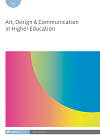- Home
- A-Z Publications
- Art, Design & Communication in Higher Education
- Previous Issues
- Volume 4, Issue 1, 2005
Art, Design & Communication in Higher Education - Volume 4, Issue 1, 2005
Volume 4, Issue 1, 2005
-
-
How art, media and design students conceive of the relation between the dissertation and practice
More LessAuthors: Tracy Pritchard, Richard Heatly and Keith TrigwellThis study examined students' conceptions of the relationship between aspects of theory and practice in art, media and design undergraduate education. This was considered specifically in relation to the dissertation which most final-year arts practice undergraduates undertake. The study was based on interviews conducted within one institution where theory and practice is normally delivered, supported and assessed by the tutors who teach the student both theory and practice. These practice/theory tutors also supervise and assess the dissertation. An analysis of interviews of a varied sample of 24 students from the disciplines of fashion design, animation and photographic arts yield four qualitatively different ways of conceiving the relations between dissertation and practice. The semi-structured interviews looked at all facets of the students' experience of how a dissertation may have an impact upon them, from considerations on how they perceived the notion of having to complete a written paper to how a dissertation may support their practice and to the simple practicalities of how they might achieve this piece of work. The categories range from the conception that the dissertation and practice are inseparable, through to a conception that the dissertation is not necessary. These different conceptions appeared to be related to variations of students' views of the role they had undertaken in relation to their own involvement in preparing and writing the dissertation. The implications of this study are discussed in terms of the relations between student conceptions of the rationale for the dissertation, and their understanding of the academic task at hand. The outcomes also suggest further avenues for research and exploration in relation to the key issues raised.
-
-
-
Developing creativity for the world of work: a case study
More LessBy Anne MasseyProfessional studies has traditionally been regarded as an add-on extra to the mainstream business of creative practice for design students. It has frequently been delivered in the final year of study and the content has normally been giving general advice on CV preparation plus appearances from successful practitioners and/or various funding bodies. This article shares the experiences of developing professional studies for students at the Arts Institute at Bournemouth as a funded ADC-LTSN project, with reference to creativity as it is perceived in the world of business and management. This revealed a dominance of the myth of the creative artist in the literature of art, design and management studies. The second part of the project involved professional trainers using psychological profiling tools and other activities with the students. This led to a consideration of the importance of teamworking for the process of creativity. The activities met with some resistance from the students. This could be explained by the prevalence of the myth of the creative artist and also the questioning culture of a higher education context.
-
-
-
Evaluating GraysNet: an online PDP tool for use in an art and design context
More LessAuthors: Julian Malins and Chris McKillopPersonal development planning (PDP) is a phrase that encompasses a number of activities including reflecting on learning, recording of achievement and career planning. Embedding these activities is a goal widely shared across higher education, but strategies for achieving it vary widely. This article provides an overview of some of these strategies including online web-based tools developed to facilitate the PDP process. The article describes an ADC-LTSN1-funded research project which evaluated a PDP system embedded within a managed learning environment (GraysNet) specifically developed to support teaching and learning in an art and design context at Gray's School of Art, the Robert Gordon University. Assessment of the PDP process has led to the conclusion that a more discursive approach may be more appropriate in an art and design context. The evaluation has resulted in a reappraisal of the way in which PDP can be supported online and makes recommendations for future developments in this rapidly developing field.
-
-
-
Understanding vernacular experiences of film in an academic environment
More LessAuthors: Martin Barker and Ernest MathijsIt is widely recognized that students' vernacular engagements with a subject such as films can interfere with their willingness to make them an object of academic study. This essay reports the findings of a small action research project, funded by the Art, Design and Communication LTSN (now known as ADMHEA subject centre), which sought to test the effectiveness of an intervention in which students' own personal responses became part of the process of study. Using the controversial film A Clockwork Orange (1971), students' responses to the film and to the issues involved in studying it were measured at the beginning and the end of a year-long module. The research revealed some complicated patterns and differences in how students responded to the film itself, which make problematic any simple account of the relationship between personal and social significance in the film. It also indicated some important relationships between kinds of personal response to the film, and the willingness to allow these responses to be the topic of critical evaluation.
-
Volumes & issues
-
Volume 22 (2023)
-
Volume 21 (2022)
-
Volume 20 (2021)
-
Volume 19 (2020)
-
Volume 18 (2019)
-
Volume 17 (2018)
-
Volume 16 (2017)
-
Volume 15 (2016)
-
Volume 14 (2015)
-
Volume 13 (2014)
-
Volume 12 (2013)
-
Volume 11 (2012)
-
Volume 10 (2012)
-
Volume 9 (2010)
-
Volume 8 (2009)
-
Volume 7 (2008 - 2009)
-
Volume 6 (2007 - 2008)
-
Volume 5 (2006 - 2007)
-
Volume 4 (2005)
-
Volume 3 (2004)
-
Volume 2 (2003 - 2004)
-
Volume 1 (2002 - 2003)
Most Read This Month


